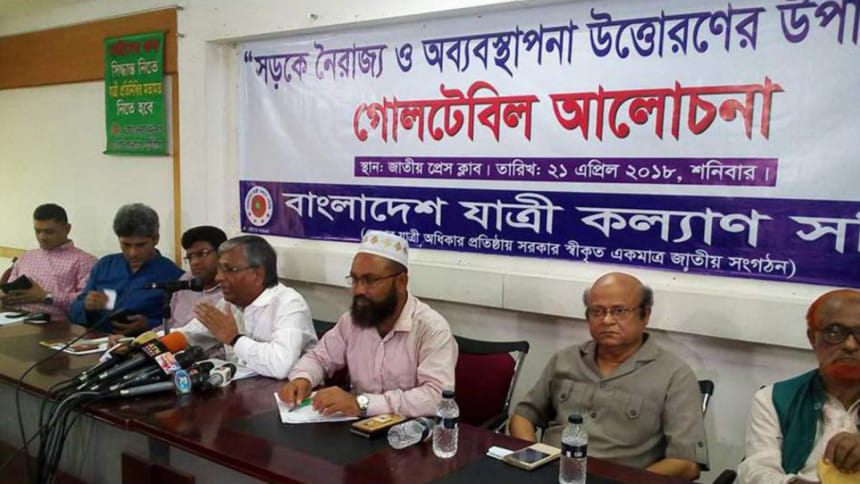A curious case of 'extortion'

The way Mozammel Hoque, a road safety campaigner, was arrested was hardly normal. A complaint was filed with the police by "a transport labour leader" accusing him of demanding extortion. Understandably, such cases are common in Bangladesh, and many of them false, targeting journalists and human rights defenders.
Unless directed otherwise, the police normally do not treat these cases as a priority. But in Mozammel's case, the police was so "prompt" that they raided his house at 3am—an ungodly hour—to detain him as if he's a dangerous criminal.
Fellow road safety campaigners have told reporters that the police officers who arrested Mozammel admitted to acting upon pressure from high-ups. It's very strange that the so-called high-ups would pressurise local police to arrest an accused in a single case when, according to the police's own data, nearly 20,000 cases were filed in July alone.
And then, the media uncovered explosive information that called into question the entire case. The accuser, Mohammad Dulal, was revealed to be a lineman at a local bus stop living hand-to-mouth, not a "labour leader" and certainly not a man from whom Tk 2,00,000 could be demanded as extortion, as alleged in the complaint.
Dulal can't even read or write. He told reporters that he had signed a statement (the court statement) as asked by local transport leaders without knowing its contents and that he didn't even know who Mozammel was.
While Dulal seemed to have changed his story later, the powers that be understand that the premise of the case has collapsed and that it wouldn't suffice to keep him behind bars for long enough. Maybe that is why the police have appealed to a court to show Mozammel arrested in a separate case filed in February under the Special Powers Act and Explosive Substances Act.
The case was originally filed against 40-45 "unnamed" people—a normal (mal)practice by the police to use the case in the future—who allegedly held a meeting to carry out subversive activities to create anarchy in the country and hurled petrol bombs on vehicles. Now the police claim that Mozammel was one of those "unnamed" persons, which is ludicrous given Mozammel's proven track record as a road safety campaigner.
Mozammel's organisation, Jatri Kalyan Samity, a passenger welfare platform, has become a familiar name of late. Almost all newspapers and news outlets quote the organisation's periodical compilation of road accidents in their reports. It's one of the most basic forms of research: flipping through newspaper reports and compiling the number of accidents and casualties. And the numbers are often staggering. According to the Samity, in the last three and a half years, more than 25,000 people were killed in road accidents across the country with thousand others injured, many crippled for life.
Such horrendous statistics didn't raise the alarm until recently when hundreds of schoolchildren took to the streets in Dhaka striving to bring some discipline to the city's roads. These youngsters had a legitimate reason: two of their fellow students had been run over and killed by a speeding bus. Protesters were eventually cracked down upon brutally, but the issue of road safety gained traction. That is why the Samity's innocent statistics suddenly seem to have become "incendiary" information.
The Samity has published regular compilation reports after Eid vacations, when the number of accidents shoots up, as millions of people from Dhaka and other big cities rush to make it home to celebrate Eid with their families. During Eid-ul-Fitr holidays in June, a total of 335 accidents took place around the country in which 405 people were killed and few more than a thousand injured, according to the Samity.
This time during Eid-ul-Azha, in August, amidst the wake of the student protests for road safety, things were not as "normal" as they were before, however. The Samity was allegedly asked by a government agency to not publish its report of Eid accidents as it would "tarnish the image of the government" ahead of the national election scheduled for the last week of December, as reported by Prothom Alo.
The Samity published its report, nonetheless, defying pressure, which found that the number of accidents increased by 13.5 percent compared to during Eid-ul-Fitr, in contrast to the government's claims that it took serious steps to improve road safety.
What's more, several top ruling party leaders lashed out at the Samity. In particular, the party's secretary and Road Transport and Bridges minister did not only attack the organisation but also its secretary general, Mozammel, personally while trashing the report. Such a response was absurd given the fact that the organisation does not prepare its report based on firsthand information. Instead, it solely depends on secondary sources such as newspapers.
The timing of the arrest was intriguing, too. Just days before a draft transport act—which earned criticism from road safety activists and organisations, including the Samity, for failing to live up to expectations—was placed in the parliament. Whereas Mozammel and his organisation's work could be beneficial for the government, his arrest shows the government has adopted a technique of silencing critics. The entire episode is mind-boggling, showing just how far the authorities can go to suppress a dissenting voice that was bringing out some unpleasant facts.
Nazmul Ahasan is a member of the editorial team at The Daily Star.




Comments